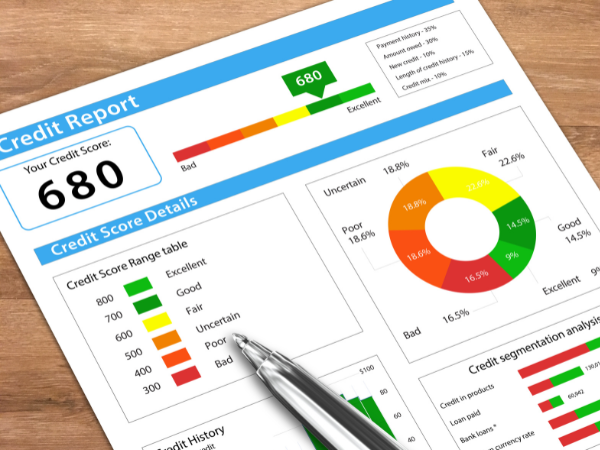For National Financial Literacy Month, Sign Builder Illustrated asked Levi King, founder of Nav, and Gerri Detweiler, author and education consultant for Nav, for ways sign business owners can leverage credit to help grow their business.
SBI: Levi , you’ve created a tech company, Nav, that helps business owners build and manage business credit, but your first business was a sign manufacturing, installation and repair company. How did you get from there to where you are now?
Levi: It was my experiences in the sign industry that led me to where I am today. I started out repairing electric signs to pay my way through college, discovered I was good at it, and eventually bought a 52-year-old sign manufacturing company.
But I learned some hard lessons about business credit along the way.
A real turning point came when I lost what would have been my biggest contract because I didn’t understand how business credit worked. I had thought I was doing everything right; paying bills early, and maintaining good relationships with suppliers.
But I didn’t realize that when I bought the assets of an established sign company, I also inherited their poor credit score. That experience, combined with later discoveries about how difficult it was to access financing information, sparked my mission to help other business owners avoid the same pitfalls.
SBI: Gerri, you started out working in consumer credit. How did you end up helping small business owners learn about business credit?
Gerri: Early in my career, I worked with a consumer advocacy group in Washington, DC. At that time, if you wanted to see your credit report, you had to take time off work to go visit a local credit bureau to purchase a copy. In that job, I had the opportunity to work on the legislation that gave consumers free annual credit reports and free credit scores.

Fast forward a few years and I was introduced to corporate attorney Garrett Sutton. He had a lot of business owner clients who were asking about business credit and financing. Together we researched and wrote our book, Finance Your Own Business: Get on the Financing Fast Track.
While researching that book, I interviewed Levi King. That was in the early days of Nav. I immediately knew I wanted to share it with my audience. After the book came out, I went to work at Nav to join their team of incredibly smart people who help business owners understand how to build and leverage credit to grow their businesses.
SBI: Levi, a lot of business owners haven’t heard about business credit, or if they have, they haven’t checked theirs. How did business credit impact you in your previous businesses? What did you learn?
Levi: Business credit had a much bigger impact than I initially realized. I learned this the hard way when I thought I had an “ace in the hole” with good credit, only to discover that my business credit report was actually a disaster because I acquired the assets of another business that had bad credit.
But the most important lesson came when I later discovered that my inability to secure larger financing wasn’t due to bad credit — it was because I wasn’t talking to the right people or applying for the right products.
I remember being told by a bank that $30,000 was the maximum line of credit I could get. Later, I learned that the same bank had seven to ten different loan products that qualified as “business lines of credit”. I just needed to know where to look and who to ask. That experience taught me that understanding your business credit isn’t just about maintaining good scores; it’s also about knowing how to use them effectively.
SBI: Gerri, what are the top questions you get from business owners about business credit?
Gerri: One thing that has struck me time and time again is that business credit and business credit scores are often a mystery to many business owners, the same way consumer credit was to many individuals when I started my career.
When I started in this field, it was rare for anyone to know what a FICO score was, much less have checked theirs. Now there are dozens of places to get free credit scores.
But business owners usually haven’t checked their business credit, and don’t know how it affects their business. Nav is the only place where they can check both business and personal credit summaries for free or to purchase comprehensive business and personal credit reports and scores for a reasonable monthly fee.
SBI: Levi, many sign shops start small, like you did. What credit-building steps should owners take early on to position themselves for larger equipment financing later?
Levi: Start establishing your business credit history immediately. Don’t make the mistake I did of waiting until you need financing to think about it. When I started my sign business, I put everything I earned back into the business because I had no credit history and couldn’t get financing. I even lived in a bare-bones apartment without basic furniture because I was prioritizing making payroll over personal comfort.
Here’s what I’d recommend:
- Start with a business credit card, even if it only offers a small credit line
- Get tradelines with suppliers or vendors that report to business credit
- Pay your bills early, not just on time
- Monitor your business credit reports regularly to catch any issues early
SBI: Gerri, is there a common misunderstanding about credit you hear from business owners?
Gerri: Some information online makes it sound like business credit is your magic ticket to getting all the business financing you need without ever using personal credit. The reality is many small business lenders check personal credit, especially for smaller or younger businesses.
Business credit opens up more opportunities as your business grows, but you want to work on your personal credit, too. Both can go hand in hand.
SBI: Levi, can you explain the difference between personal and business credit, and why separating them is particularly important for sign shop owners?
Levi: This distinction is crucial, especially in the sign industry where you often need significant capital for equipment and materials. Think about it this way: personal credit follows you as an individual, while business credit follows your company.
The sign industry is equipment-intensive — you need bucket trucks, manufacturing equipment, installation gear — and you don’t want all that financing tied to your personal credit.
I learned early on that relying solely on personal credit limits your growth potential.
When you separate your business credit, you create a second pathway to financing that doesn’t impact your personal credit limits or risk profile. Plus, business credit typically offers higher credit limits and better terms for major purchases, which is essential when you need to invest in expensive sign-making equipment or expand your operations.
The same credit card company that wouldn’t give me more than a $500 credit limit in the beginning eventually gave me over $100,000 in unsecured credit. It took time to get there, and I want to help other business owners get there too.
Bios
 Levi King is a lifelong entrepreneur who has started and sold several successful small businesses and built multiple venture backed tech companies, including Nav. He made it his mission to help business owners access, understand and build their credit health to become better-qualified for business credit and financing. Levi contributes content to a variety of outlets enjoyed by small business owners and entrepreneurs, including Inc., Entrepreneur, Startup Nation, and Forbes.
Levi King is a lifelong entrepreneur who has started and sold several successful small businesses and built multiple venture backed tech companies, including Nav. He made it his mission to help business owners access, understand and build their credit health to become better-qualified for business credit and financing. Levi contributes content to a variety of outlets enjoyed by small business owners and entrepreneurs, including Inc., Entrepreneur, Startup Nation, and Forbes.
 Gerri Detweiler has several decades of experience guiding individuals through the confusing world of credit, and has earned a reputation as a reliable and independent source on personal and small business credit. Today, Gerri serves as education consultant for Nav, a financial health platform for small businesses owners to build and manage their business and personal credit, track cash flow patterns, and understand their financing options before they apply.
Gerri Detweiler has several decades of experience guiding individuals through the confusing world of credit, and has earned a reputation as a reliable and independent source on personal and small business credit. Today, Gerri serves as education consultant for Nav, a financial health platform for small businesses owners to build and manage their business and personal credit, track cash flow patterns, and understand their financing options before they apply.











